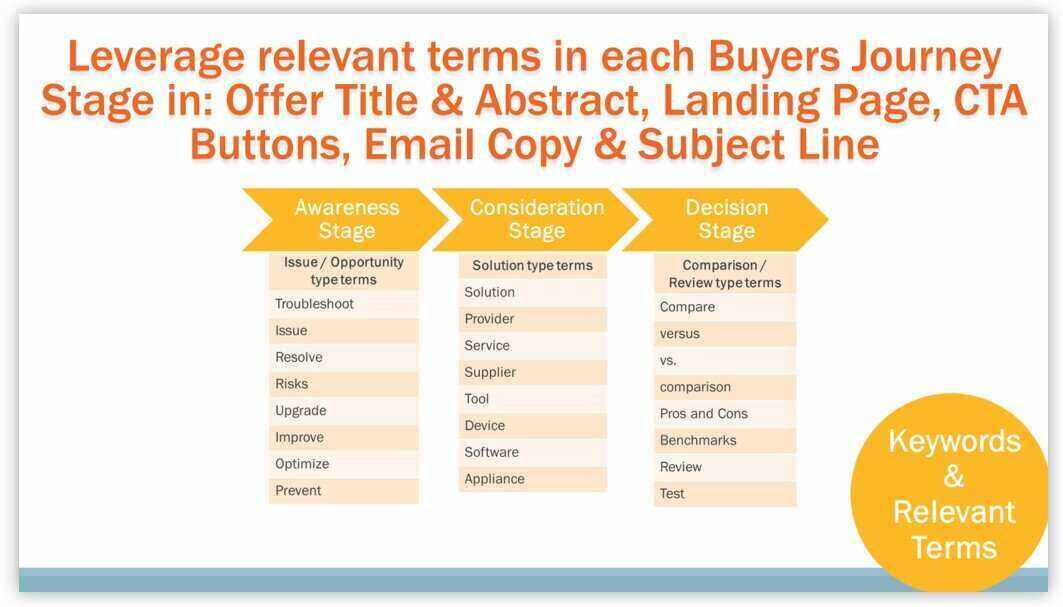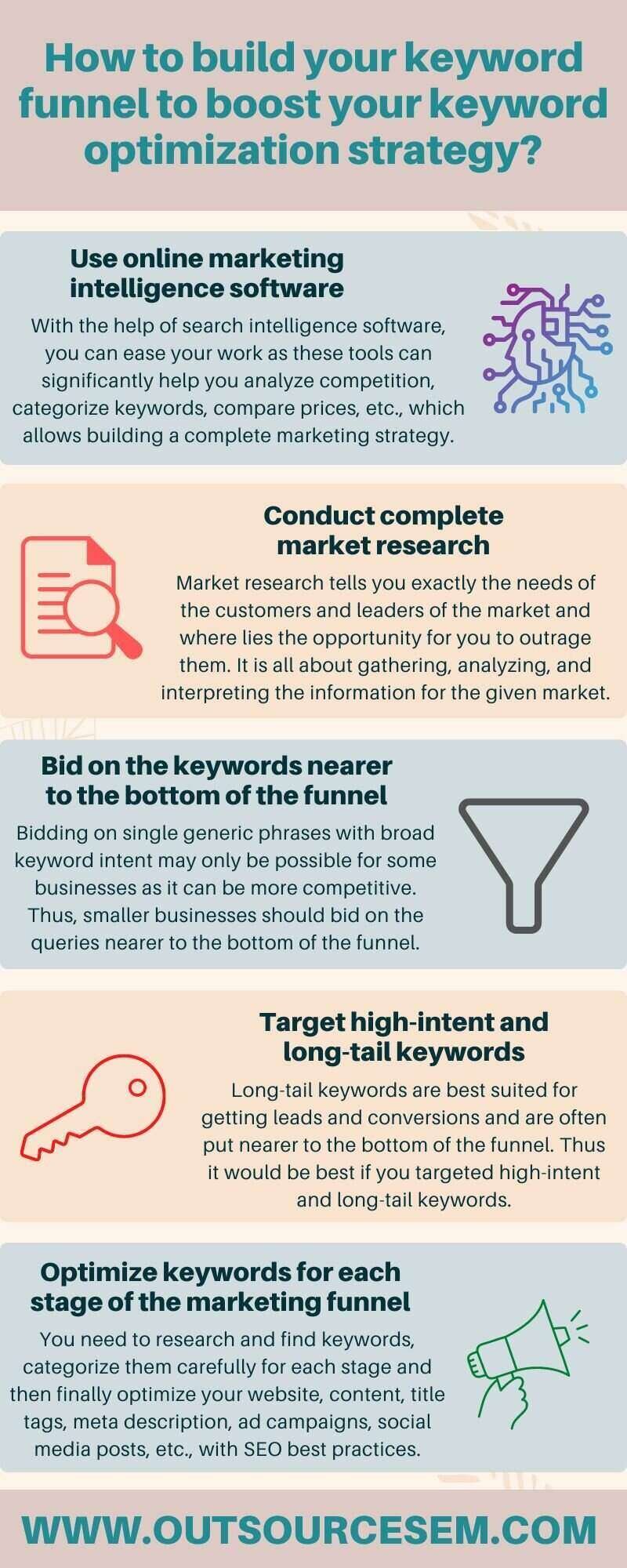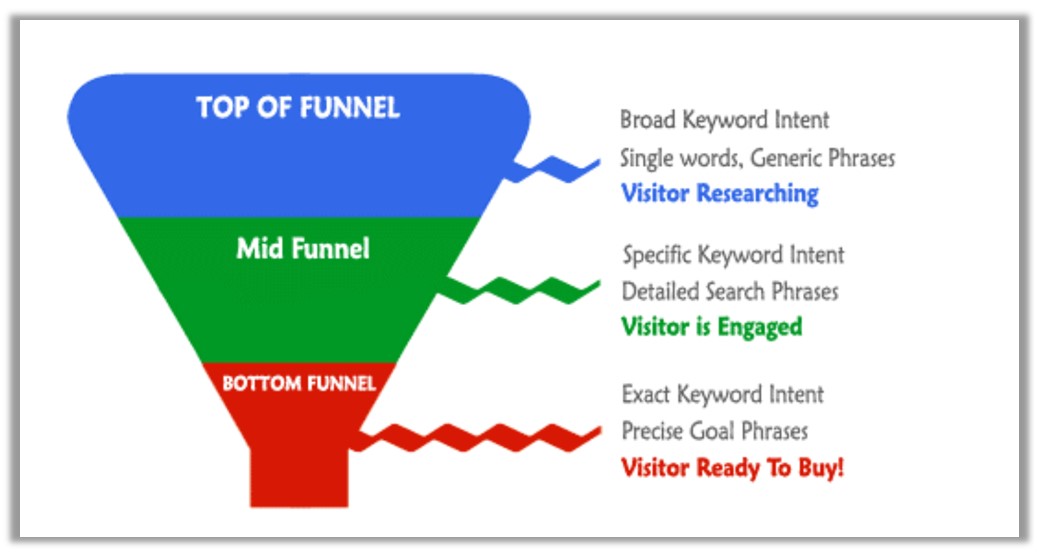According to the data presented by the world bank, 72% percent of the total US population was using the internet in 2010, which became 91% by the arrival of 2020. It means there is a 19% positive change during a decade. These stats indicate that the number of users is increasing day by day. However, there are still many issues websites face to get conversions and miss out the potential customers. The primary thing that marketers need to focus on in their digital marketing is working on keyword strategy. Only conducting keyword research, looking at the monthly search volume, and comparing with competitors doesn't guarantee a conversion. Nonetheless, these help in planning strategies for better ranking on the SERPs. In this blog, we will discuss what a keyword funnel is and how working on these strategies boosts conversions.
What is a keyword funnel, marketing funnel and buyers’ journey?

Before getting into the discussions of keyword funnel and understanding this term first, you need to have clarity on users’ buying journey. Whether you talk about online purchasing or offline shopping, there is never a situation when a user wakes up and decides to shop for a product or service. Various steps or processes are involved before making a final purchase, i.e., awareness, consideration, evaluation, and purchasing. This journey of the user from the initial to the final step in the buyer's path to purchase is called the user’s buying journey. The buyer’s journey includes the phase of attraction, awareness, consideration, and conversion. There are different stages of the buying process before a user reaches the final purchase.
A keyword funnel is the analysis and use of the user's keyword searches and categorizing them into stages of a user's buying journey. It is part of deep keyword research and organizing it so that it can be used efficiently. It can also be used in the content strategically as a part of the next-level content marketing strategy.
Here often comes another similar term that is interchangeably used by most users - marketing funnel. The marketing funnel is the initial (when users learn about your business) to the final (when users make a purchase from your business). In comparison, the keyword funnel is the organization of the keyword used by the users during the initial to final of the path to purchase. The keyword funnel's purpose is to optimize the website and its content effectively so that the customers become aware of our business and guide them to the conversion stage. The keywords funnel stages, and their benefits will be discussed in the coming sections.
What are the benefits of keyword funnel strategy?
● Enhance content marketing efforts - Keywords play a vital role in making your content marketing efforts successful. With the help of a keyword funnel, you can create content in the form of blogs, videos, podcasts, engaging infographics, social media posts, etc., that guides the users from the initial to the final step of the buying journey.

● Rank higher on SERP - The ranking on the search engine results pages depends to a great extent on proper keyword research and optimization. Thus, the keyword funnel helps you to find keywords and optimize them so that you are eligible to rank for all the queries of the users used at different stages. So you can rank high on SERP, or SERP features like people also ask box, featured snippets, etc.
● Lead generation - One of the primary motives of the keyword funnel strategy is lead generation, and yes, it works like no other strategy. As the number of leads you get depends on how nicely you categorize and optimize your keywords, it becomes crucial for your business to focus on the marketing funnel and keyword funnel.
● Building brand awareness - More prominent brands invest heavily in building brand awareness, but the effective keyword funnel strategy helps build a brand. According to SEO experts, a keyword optimization strategy is a complete SEO strategy. It can familiarize a large audience with the brand for their search query in their buying journey, and when your brand ranks higher in the search results, it helps build brand image and increase brand awareness.
● Link building opportunities - The importance of internal or external linking is very well known to the digital marketers as it will allow you to link the resources of the internet to your content and provide your audience with a great user experience and more resources to explore. It provides opportunities for link building, getting backlinks from other authorized websites, etc., so that Googlebot can easily crawl and index your website.

● Getting more conversions - A keyword funnel strategy is super helpful in earning conversions that turn visitors into customers. It can help you get organic leads and conversions that make your SEO keyword strategy successful.
What are the different keyword funnel stages?
As discussed above, any user does not suddenly decide to purchase something. There is a process that starts with the need or wants then, followed by the research and gathering information about their problem and what is the best helpful solution for it. After these steps, they consider the various options available in the marketplace before finally deciding to purchase the product or service.
Based on the analysis of the users’ buying behavior, the keywords can be categorized into three marketing funnel stages for which you can find and organize your SEO keywords.
● Awareness stage - When users are aware of their needs and seek information or research for a helpful solution, it is said that they are in the awareness stage. It is the stage where a customer wants a particular service or feature and becomes aware of the various products or services available in the market. Then they begin to research the best product at a budget-friendly price. “Issue or opportunity” type terms and informational queries are popular in this stage seeking general information.
● Consideration stage - At this stage, users are actively searching for the problem of their solution. Considering and evaluating the options available in the market and trying to choose or find the best one for themselves. This is like visiting the market, asking about the product and its prices, and comparing it with another. It includes examining your website, cost, product, reviews, comparing alternatives, etc. Targeting the users in this stage is crucial as they are very close to the conversion. Solution-type terms are popular and frequently used in this stage by users.

● Decision stage - After the consideration stage, there comes a decision stage where a user is about to confirm the purchase for the specific product after the final review, benchmarks, or tests. Comparison or review-type terms like compare versus, pros & cons, benchmarks, review, etc., show that the user is in the decision stage.
An effective keyword strategy targets all three stages to gain a conversion. This is the ultimate target of the keyword funnel and is counted as one of the most useful digital marketing strategies. The image below from the Hubspot inbound conference categorizes the keywords better that are used in the three keyword funnel stages.

How to build your keyword funnel to boost your keyword optimization strategy?

● Use online marketing intelligence software - After the ease of access to the internet, users research more for the products or services to find the most suitable deal; also, multiple options are available for a particular need. These things increase the advertiser's headache in getting conversions for their business. With the help of search intelligence software, you can ease your work as these tools can significantly help you gather information, analyze competition, categorize keywords, compare prices, etc., which helps build a marketing strategy. The more data you collect and study, the better techniques you can create to boost your keyword strategy. You can also outsource SEO keyword research, competition analysis service, etc., from a prominent digital marketing company for better results.
● Conduct complete market research - While describing your digital marketing strategies, conducting market research or outsourcing a company is crucial as it tells where you exist in the current market scenario. It tells you exactly the needs of the customers and leaders of the market and where lies the opportunity for you to outrage them. With the help of market research, you can optimize your keywords and services to meet the needs of the current market demands. Market research is all about gathering, analyzing, and interpreting the information for the given market.
● Bid on the keywords nearer to the bottom of the funnel - The keyword funnel has three levels;
1. Top of the funnel
2. Middle of the funnel
3. Bottom of the funnel
Defining a keyword strategy for each level of the funnel is crucial to move your potential customers from the top to the middle of the funnel to the bottom to gain conversion. Each phase has different intent of keywords used, different levels of user engagement, search intent, etc., thus requiring a target on each level by defining a separate marketing strategy for each. The image below by WordStream depicts a better picture of the funnels and the types of keywords used in them.

But bidding on single generic phrases with broad keyword intent is only possible for some businesses as it can be more competitive and may have a high cost-per-click. Thus, particularly for smaller businesses, we recommend letting the prominent players of your field bid on the keywords used at the top of the funnel, i.e., research-stage keywords. You can save your advertising budget by bidding on the queries nearer to the bottom of the funnel. This can increase your chances of getting conversion by saving on your overall advertising campaign cost.
● Target high-intent and long-tail keywords - Short-tail keywords are often used for information and research purposes by users, and conversions on these keywords are very low. It is better suited for targeting prospects at the start of the marketing funnel, i.e., on the top of the funnel. Also, it is true that conversion on the top of the funnel is low as it aims to drive traffic to the page. On the other hand, long-tail keywords are best suited for getting leads & conversions and are often put nearer to the bottom of the funnel. Thus, it would be best if you targeted high-intent and long-tail keywords closer to the bottom of the funnel.
● Optimize keywords for each stage of the marketing funnel - One of the major issues advertisers face in gaining conversions is guiding users through each stage of the marketing funnel. It needs proper market research and a deep analysis of the buyers' journey. You need to research and find keywords, categorize them carefully for each stage and then finally optimize your website, content, title tags, meta description, ad campaigns, social media posts, etc., with SEO best practices. It would be best if you optimized for each stage of the marketing funnel; content marketing proved to be very useful for guiding customers from the awareness stage to the conversion.
Final thought
For maximum leads and conversations, digital marketers need to pay more attention to the marketing funnel and keyword funnel as a part of their marketing strategy. The fact is that it has a direct relation to increasing your leads and conversion rate. Only conducting keyword research and finding SEO keywords may be a partial keyword strategy. Thus as a digital marketing company, our SEO experts can significantly help you in search engine optimization, paid campaigns, content marketing, social media marketing, etc. We provide SEO services, SEO plan and strategy services, SEO copywriting, content marketing, email marketing, and many more at a very genuine price. Our SEO experts excel in crafting comprehensive digital marketing plans that drive results by providing various SEO services like electrician SEO, flooring SEO, roofing SEO, lawyer SEO, small business SEO and much more to various businesses, we deliver tailored strategies to help you dominate your industry. Let's work together to transform your marketing efforts into a lead-generation powerhouse.
Reference
● Stop guessing, start converting: Here are the keywords to use for awareness, consideration, and decision stage content
● How to use the keyword funnel to understand searcher intent
